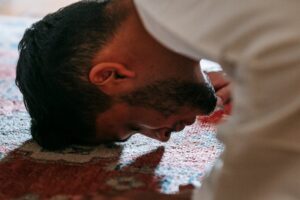The response of the individual believer to “testing” or ابتلاء is usually more emphasized than the collective response of the community. Yes, as individuals, we are tested at every moment in our daily lives. Quran states the undisputable fact that trial and challenge are part and parcel of the human existence. “Verily We created man from a drop of mingled sperm, in order to try him: So, We gave him of hearing and sight. We showed him the way: Whether he be grateful or ungrateful.” [76:1-3]
Human beings are not created in vain or absurdity. In order to achieve their humanity as a project over time, human beings are equipped with senses and faculties and supported by a system of guidance revealed to them by their Creator. At the same time, they are continuously tried and challenged in order to grow and develop, intellectually and spiritually, as they struggle to successfully realize their project.
However, the social aspect of “testing” is unfortunately overlooked. Every time an individual or a community is faced with fear and insecurity, hunger, loss of wealth, property, or human life, the issue is treated and analyzed from an individual perspective. On the contrary, the discourse of Quran is in the plural: all the community rather than the individual is addressed. “And We will surely test all of you with something of fear and hunger and loss of wealth and lives and fruits, but give good tidings to the steadfast.” [2:155]
The real questions we need to ask ourselves are:
What should our reaction as individuals and communities be in such circumstances?
What should we do to alleviate the burden of testing upon others?
What should we do to control and prevent such calamities before they happen?
We really pass the test once we find ourselves engaged in the relief, control, or prevention process. Success is measured by the amount of empathy, sympathy, love, and help we express and deliver to those who are in distress. This requires dedication of time, wealth, efforts, and good intentions in order to see better outcomes. Only then we see the good tidings promised to the patient and the perseverant. “But give good tidings to the steadfast.” [2:155]
It is interesting to note that in the same Quranic passage we find the allusion to the ritual of “sa’ay” سَعْي between Safa and Marwa during Al-Hajj or Umra. “Behold! Safa and Marwa are among the symbols of Allah. So those who visit the House in the season or at any other times should compass them around.” [2:158]
This is very reminiscent of Hajar, the wife of Prophet Ibrahim, running back and forth in search of water for herself and for her infant, Ismael. In an environment of extreme difficulty, in a valley without cultivation surrounded by arid mountains and spacious deserts, we see an extreme case of human weakness: a young woman with her breast-fed infant. Hajar and Ismael are teaching us a valuable lesson: No matter how difficult the conditions are and hostile the environment is, do not give up. Allah has put inside you great capabilities and potentials to overcome and prevail. This is exactly what happened. Water sprang out between the feet of Ismael, and both survived the trial and the ordeal.
Like Al-hajj, prayer is another model that can teach us about patience and perseverance. In the same passage we also read: “O you who believe! Seek help with patient perseverance and prayer, for Allah is with those who patiently persevere.” [2:153]
The connection between patience and prayer is evident. Every time we connect with Allah through prayer, we are acknowledging the need for his support while we are responding to a new trial or to an emerging challenge. Prophet Mohammad (S) put it nicely into application in the way he acted at the time of difficult testing: “Every time a difficulty would afflict the Prophet, he would resort to prayer.”
Patience and perseverance are not idle reactions but reflections of conscious decision-making, resolve, and hard work. “And bear with patient perseverance whatever betides you. That is of the matters requiring determination and resolve.” [31:17]
Patience and perseverance are highly connected with time – time needed to see the results of the intervention to prevent a disaster or to relieve those affected by the disaster. In the instances of “testing”, Quran connects patience with “taqwa”تَقْوى. “And if you are patient and cautious.” [3:186] “Taqwa” here in the social setting means prevention and protection against possible calamities coming either from nature or from a human source.
In Part 2, we will focus on the Quranic approach when the phenomenon of testing and trial is twisted and exploited as a measure to define the social status of the members of the community.
By Dr. Walid Khayr




